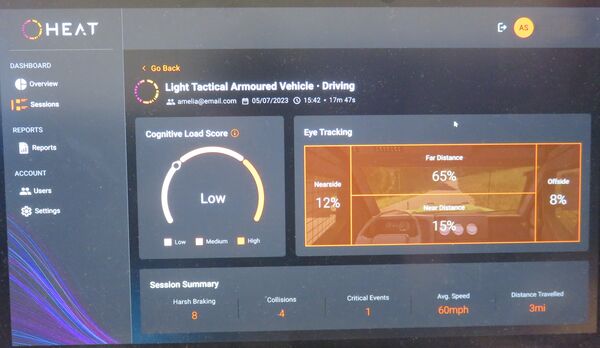
A simple HEAT dashboard from an AFV driving simulation session, showing the cognitive load score, the eye-tracking data, and a summary of the main session data. (Giles Ebbutt)
Irish data analytics firm VRAI has refined its Hazardous Environment Awareness Trainer (HEAT) human performance data collection and analysis capability and is developing new partnerships to incorporate it into training, Janes has learnt.
Martyn Harvey, VRAI’s HEAT development manager, explained that the system “captures human performance in simulators and provides active and intuitive insights to improve performance”. This can either be for single trainees, platform crews, or multiplatform units, enabling comparative analysis between crews or units, he said.
“HEAT is data source-agnostic and can collect both simulator and trainee biometric data, such as heart rate or eye tracking, and it is then stored in a standardised form,” Harvey told Janes at the Defence Simulation Education and Training (DSET) 2025 conference held in Bristol from 8 to 10 July. The data is then analysed using VRAI’s proprietary technology, which includes an element of artificial intelligence. “A key feature is cognitive load, which we measure principally using the biometric data. The comparative score is initially based on a human average but over time the semi-supervised learning model adjusts the thresholds. So for example the base might be for an average pilot at that stage of training rather than an average human,” Harvey noted.
He added, “The data is used to calculate the zone of proximal development for the individual, which is where the level of stress creates the ideal conditions for learning.” The results are presented on a dashboard, which can be customer-defined by subject matter experts to visualise and display specific requirements.
Looking to read the full article?
Gain unlimited access to Janes news and more…
